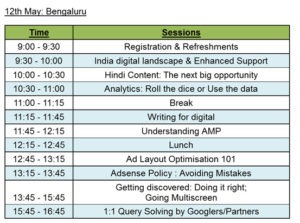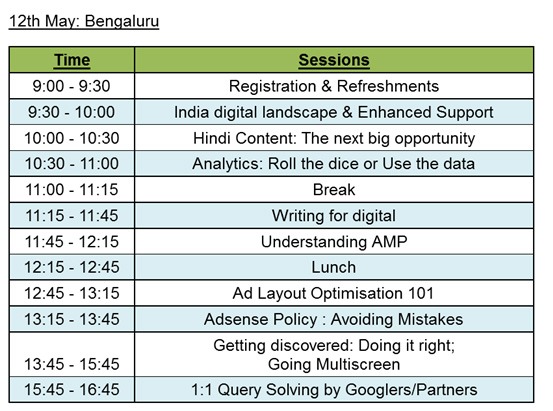Posted by Khusboo Trivedi
Google India Publishers Meet 2016 – Bengaluru !
Google provides a fantastic opportunity for every web master out there, to monetize their web assets by becoming a publisher. Google Adsense is the simplest way to earn money online. It simply means make money online through web monetization. This meet was basically guidance for all the Indian web publishers.
The Google India pub meet at Bengaluru was scheduled on 12th May 2016, Thursday at Google India Pvt Ltd.
Venue of Google pub Meet:
Google India Pvt. Ltd.
No 3, RMZ Infinity,
Tower E, 4th Floor
Old Madras Road
Bengaluru.
Agenda of Google India Publishers Meet:
This year Google conducted Publishers meet at 4 locations, namely Indore, Lucknow and Gurgaon and Bengaluru. The Google India Publishers meet was an informative event, which highlighted a lot of points on Adsense, Google Analytics, Content Writing and publishing, Ads placement and testing and AMP (Accelerated Mobile Pages).
The meet started at 9.30 AM with a presentation on India Digital Landscape and enhanced support. Statistics revealed that every 1 out of 3 users in the web were mobile users. The presentation focused on the increase number of web users both from rural and urban areas. Some reasons being:
- Data services are provided at the cheapest price in India.
- Smart phones are the next generation rulers of the web
- Accessing the web just got simpler.
The presentation ended with a video on how smart phones have become a vital part of the World Wide Web.
The Hindi content:
Hindi, being the national language of India, has grounded its importance in the ever growing internet as well. Numbers reveal that majority of users; both from rural and urban areas would like to see web data in the regional language Hindi. A survey on the regional language preference revealed that Hindi was the most spoken language among any other in India.
It is observed that there are only few publishers, as less as 0.1% among the total number of publishers, who are publishing Hindi content. The reasons being:
- Difficulty in writing in Hindi language
- Lack of resources to reach out to the correct users.
Google tools just made it simpler for web publishers to write Hindi content. Google tools like the GOOGLE TRANSLATE, GOOGLE INDICS KEYBOARD, and GOOGLE INPUT TOOLS, has made it simpler for users to write and publish Hindi content.
Google Adsense algorithm is also being designed to identify regional language content in order to welcome advertisers who would like to advertise in their regional languages.
The Hindi Content session ended with a motivational video from a recipe blogger who gained recognition by way of posting Hindi videos and content.
Four well known certified partners of Google namely Nabler, Cybermedia, Readwhere and Adpushup hosted seminars on interesting and informative topics.
Analytics: Roll the dice or use the data:
Google Analytics, a free to use data tracking tool from Google was interrogated on by the team Nabler. Google analytics has excellent features that support the web developers and users in making insights about the website. A good option suggested by nabler was to integrate Google Adsense account with Google analytics account.
Real time examples of website owners who experienced drastic change in their business after making the necessary changes that were noticed from analytics were mentioned in the seminar.
Writing for digital:
The next session at Google India publishers meet was on “writing for digital” which was hosted by the team from cyber media. The key tips highlighted while considering in writing for digital were:
- Keep it short and simple
- Focus on cluster of topics
- Play around visual content : Sliders, Infographics and tables
- Recycle old articles and arrange in clusters
Some useful tools pointed by presenters for content discovery:
- Feedly
- Pulse
- Quora
- Spike
Tools for content distribution:
- Buffer
- Slideshare
- Phplist.com
- Mailchimp
- Bundlr
Useful tools for organizing content:
- Trello
- MindNode
- WunderList
The presentation revolved around ideas that focused on keeping the content easy and simple to understand. Emphasis was given on creating interactive and visually appealing content that included Infographics, sliders and data tables.
Study revealed that headlines of your content play a vital role in deciding whether or not your content will be read. Direct headings, controversial headings, intriguing and productive headings are a number of options to choose from.
Understanding AMP (Accelerated mobile pages)
The session following “writing for digital” was AMP. Understanding Amp and implementing in websites in order to render excellent fast loading mobile web pages. This session was hosted by Google certified partner Readwhere.
Accelerated Mobile Pages are designed to load faster when compared to other normal pages. Study shows that there is an increase in the bounce rate for slower loading web pages. If you would like to retain your website users, you need to focus on faster loading mobile pages. AMP is an open source initiative by Google that helps design faster loading mobile friendly pages.
There are certain tag constraints that AMP adheres to and restricts the usage of certain tags that hinder the loading time of a web page.
A completed guide to use AMP https://www.ampproject.org/docs/support/faqs.html
Ad Layout optimization:
The team Adpushup hosted the seminar on ad layout optimization. The key ideas and take a-ways from this session were:
- There is no fixed layout for ads. It completely depends upon the website and user behavior response.
- Ad placement experiment is the only way to figure out the best ad placement for any web page
- Ad color testing will help you know better about user behavior
- Show different ads to different users, this will help notice changes in CTR.
Adsense Policy: Avoiding Mistakes:
The next session was the most useful of all. The session was hosted by Google; it highlighted points on Adsense policy guidelines and avoiding the common mistakes.
Avoiding common mistakes:
- Avoid placing ads on thank you pages. It leaves no other option for the user but to click the ad, which results in accidental clicks.
- Never place ads that confuse the user with the site navigation.
- Do not use adult content with websites running ads
- Copy paste content websites are not suitable for placing ads
- Avoid clicking your own ads
- Be careful while working with websites
- Avoid your own accidental clicks.
Adsense Policy guidelines:
Google takes different measures on accounts based on the type of violation the website makes. As a general practice, Google sends a warning email in order to make changes to the website within 72 hours; in the case otherwise Google will disable ads to that particular website. If the areas in the website that are causing violation are fixed, the chances of site ban are nil and the ads will be enabled back.
The following actions are taken by Google in case of policy violation.
Account Warnings:
The very first thing that happens in case of policy violation is that you receive a mail from Google asking you to make changes to vulnerable areas in the websites. The tie period to make these changes is 72 hours.
Ads disabling:
Ads are disabled to your website until you fix the vulnerable changes. Once you fix the issue ads are automatically enabled by Google.
Account suspension:
Account suspension happens when repeatedly your site has been noticed for violating the policies. You receive an email from Google stating that your account is suspended for 30 days and that no ads will be served for 30 days in the website.
Account disabling:
Google disables Adsense accounts for those who continuously violate the policies and do not fix major issues in spite of repeated warnings. Account disabling leads to account ban.
Getting discovered: Doing it right, Going Multi Screen:
The last session a Google India Publishers Meet was hosted by Mr. Syed, Senior search analyst Google. The session revolved around topics that were related to getting your website noticed in Google, indexing and other common myths that users believe in.
Common myths:
- Duplicate content will penalize your website:
Similar or duplicate content within your own website will cause no harm to your website - PageRank is dead vs PageRank is everything:
Page rank is not dead. Also page rank is the not the only factor that Google considers - Google Products: helpful/harmful?
There is no harm in using Google products, but yes using Google products will render no special benefit - Optimal keyword density:
There is no optimal keyword density. As long as the flow of content is natural, there is no harm in using the keywords as many times as possible - Myth about shared IPs:
Certain users believe that shared IPs will lead to the entire account ban if one or two websites from the account have received warnings. It is not so, other websites will continue to serve ads irrespective of shred IPs. - An incorrect sitemap will result in manual action:
Sitemaps are just for information purpose. Sites with incorrect sitemaps will not be penalized. But it is always a best practice to run correct site maps.
The session ended with one to one conversation with Google employees discussing and clearing doubts about Adsense. Over and all, Google India publishers meet was an excellent informative session that projected a clear insight into the web world!






